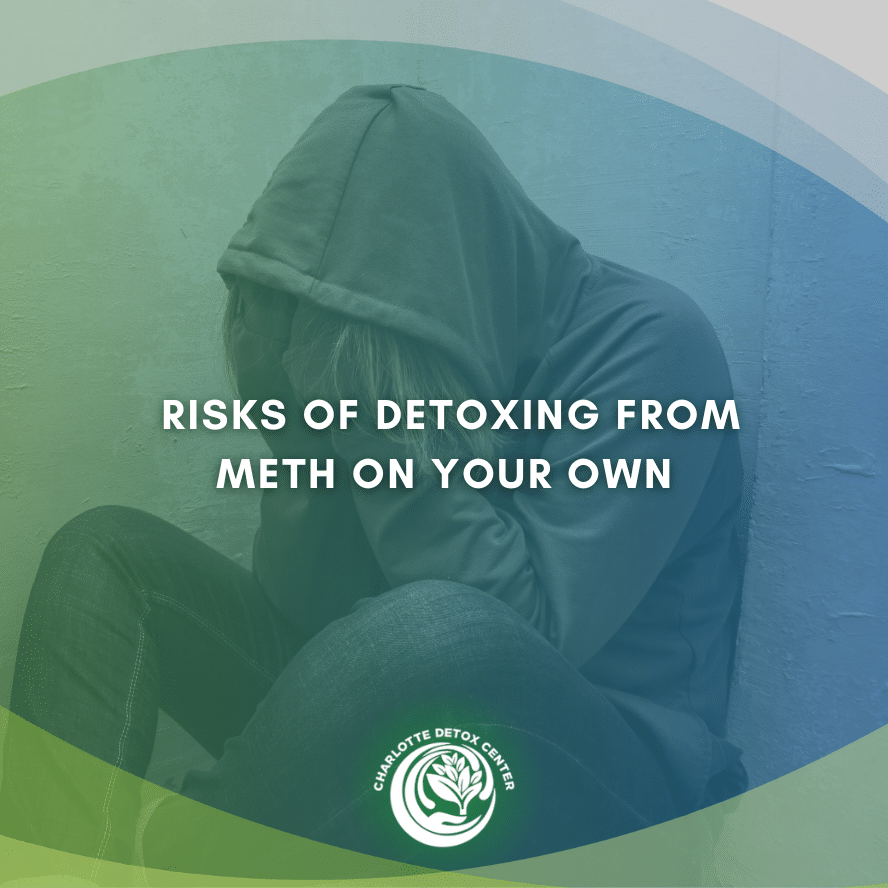4 Risks of Detoxing From Meth on Your Own

Medically Verified: 2/1/24
Medical Reviewer
Chief Editor

All of the information on this page has been reviewed and verified by a certified addiction professional.
Meth is a potent stimulant drug that is seldom used to treat attention-deficit hyperactivity disorder (ADHD) under the name Desoxyn.[1] While meth is used medicinally, most people who abuse it are buying it off of the street. As a result, they are receiving an illicit form of meth that can contain a variety of dangerous household chemicals.
According to the National Institute on Drug Abuse (NIDA), 2.5 million people reported abusing meth in 2021.[2]
If you or a loved one are addicted to meth, you might be wondering whether you need to attend medical detox. While meth withdrawal is rarely life-threatening, it is never recommended to detox on your own. Doing so could result in a variety of mental health concerns including suicidal thoughts and psychosis as well as relapses and overdoses.
What are the Symptoms of Meth Withdrawal?
When you are addicted to meth, your brain and body begin to rely on it to function properly. This is why suddenly stopping the use of it will result in withdrawal symptoms. While meth withdrawal does not cause severe physical symptoms, the psychological effects can be devastating without proper treatment.
The common symptoms of meth withdrawal include:[3]
- Headaches
- Cravings for meth
- Shaking and tremors
- Anxiety and agitation
- Depression
- Increased appetite
- Fatigue and increased sleep
- Decreased motivation
- Changes in mood
- Cognitive issues
- Increased risk of psychotic symptoms
The depression caused by meth withdrawal can be severe without treatment, sometimes leading to suicidal thoughts. This is one of the many reasons you should never attempt to detox from meth on your own.
What are the 4 Risks of Detoxing From Meth at Home?
While it might be tempting to skip attending a medical detox center, meth withdrawal is not easy to overcome on your own. Because of the severe psychological symptoms associated with meth withdrawal, trying to detox at home can be dangerous.
The top 4 risks of detoxing from meth on your own include:
1. Relapse
The first risk associated with detoxing from meth at home is relapsing. Because of how strong the cravings can be to use meth, you might be tempted to return to your substance abuse before you overcome the withdrawal phase of recovery.
In addition to the cravings you will experience, the psychological symptoms can be severe. From intense anxiety and feelings of paranoia to depression and suicidal thoughts, the idea of using meth again might seem better than dealing with your symptoms. This is why you should always attend a medical detox center that can provide you with medications to ease your symptoms.
2. Overdose
If you end up relapsing on meth because of how severe your symptoms are, you could be at risk of overdosing.
Before you stopped using meth you developed a tolerance to the drug. This means you were able to use large amounts without experiencing an overdose. When you relapse after a period of abstinence and attempt to use the same amount as you used to, that tolerance is gone and you are at risk of a life-threatening overdose.
The symptoms of a meth overdose include:[4]
- Agitation or aggressive behavior
- Paranoid thoughts or delusions
- Chest pain
- Rapid heartbeat or palpitations
- Breathing issues
- Elevated body temperature
- Heart attack or cardiac arrest
- Seizures and strokes
If you experience a meth overdose, contact emergency medical services immediately.
3. Increased Mental Health Symptoms
While meth withdrawal does not cause severe physical symptoms, mental health symptoms can be incredibly difficult to cope with. If you already have a mental health condition, your risks of experiencing severe symptoms are increased substantially.
Meth withdrawal can cause a variety of adverse psychological effects, including depression, anxiety, paranoia, panic attacks, and suicidal thoughts. People might also engage in self-harming behaviors during meth withdrawal. As a result, you should always seek support from a medical detox center that can provide you with short-term psychiatric meds to counteract your symptoms.
4. Psychosis
Meth withdrawal can also cause symptoms of psychosis, which can be dangerous if you are alone. Your risk of experiencing psychosis during meth withdrawal is increased tenfold if you have a family history of psychotic disorders like schizophrenia or schizoaffective disorder.
The symptoms of psychosis include:[5]
- Paranoia or suspicion
- Trouble thinking clearly or logically
- Social withdrawal
- Overly intense ideas and strange feelings
- A lack of feeling altogether
- Decline in personal care or hygiene
- Difficulty distinguishing fantasy from reality
- Confused speech or trouble communicating
- Hallucinations and delusions
Find Help for Meth Withdrawal
If you or a loved one suffers from meth addiction, the first step in recovery should always be medical detox. Attempting to detox at home could result in dangerous psychological symptoms like suicidal ideation and psychosis. Additionally, you could relapse and overdose if you are not receiving care from a detox facility.
To learn more about our meth detox program, contact Charlotte Detox Center today.
References:
- The Drug Enforcement Administration (DEA): meth, Retrieved November 2023 From https://www.dea.gov/factsheets/meth
- The National Institute on Drug Abuse (NIDA): What is the scope of meth use in the United States, Retrieved November 2023 From https://nida.nih.gov/publications/research-reports/meth/what-scope-meth-misuse-in-united-states
- The National Library of Medicine (NLM): Withdrawal symptoms in abstinent meth-dependent subjects, Retrieved November 2023 From https://www.ncbi.nlm.nih.gov/pmc/articles/PMC3071736/
- The National Library of Medicine (NLM): meth Toxicity, Retrieved November 2023 From https://www.ncbi.nlm.nih.gov/books/NBK430895/
- The National Institute of Mental Health (NIMH): Understanding Psychosis, Retrieved November 2023 From https://www.nimh.nih.gov/health/publications/understanding-psychosis
